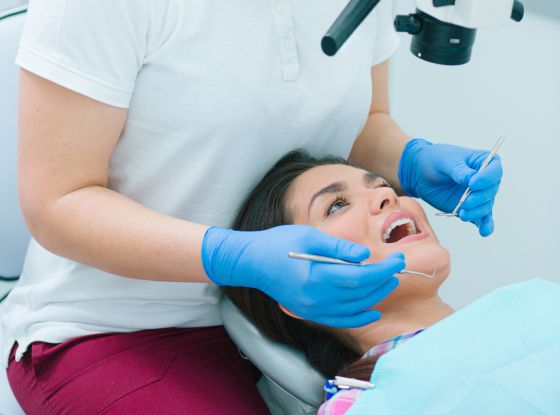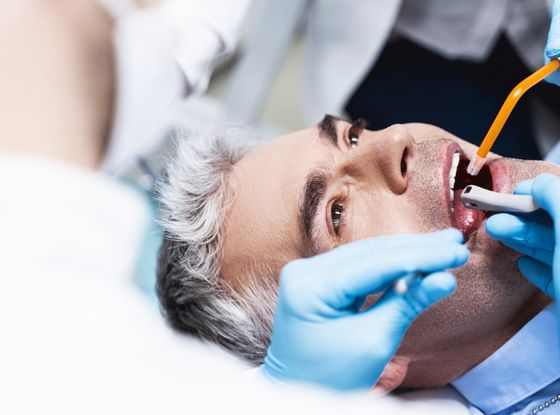Understanding Root Canal Therapy

What to Expect During a Root Canal Procedure
When it comes to dental procedures, few are more misunderstood than root canal therapy. Although root canals may cause anxiety, they are often the best way to save a tooth that would otherwise need extraction. If you’re experiencing tooth pain, understanding root canal therapy can help ease your concerns about the procedure.
At Green Dental Care, we provide high-quality, comfortable dental care in a supportive environment. As the best dentist in Parker, CO, we take pride in helping our patients achieve healthy smiles, and that includes offering effective solutions like root canal therapy.
What Is Root Canal Therapy?
Root canal therapy treats infection or damage to the tooth’s pulp. The pulp, containing nerves and blood vessels, can become infected due to cavities, trauma, or cracks. If left untreated, this infection can spread and lead to abscesses, bone loss, or tooth loss. Root canal therapy removes the infected pulp, cleans the inside of the tooth, and seals it to prevent further infection.
When Is Root Canal Therapy Necessary?
Root canal therapy is typically recommended when a tooth’s pulp becomes infected or inflamed. This can happen for several reasons:
- Severe Decay: A large cavity that reaches the pulp of the tooth can cause an infection.
- Tooth Injury: A crack or chip in the tooth can expose the pulp, leading to infection.
- Recurrent Dental Procedures: Multiple fillings or treatments on the same tooth can irritate the pulp and cause damage.
- Gum Disease: In some cases, advanced gum disease can affect the tooth’s pulp.
Common symptoms that indicate the need for a root canal include:
- Persistent tooth pain, especially when chewing or applying pressure
- Sensitivity to hot or cold temperatures that lingers after the stimulus is removed
- Swelling or tenderness in the gums near the affected tooth
- A darkened or discolored tooth
If you have these symptoms, see a dentist promptly to prevent complications.
The Root Canal Procedure
Many avoid root canals due to fear, but the procedure actually relieves pain and saves the tooth. Here’s a step-by-step breakdown of what you can expect during a root canal:
Initial Evaluation: Your dentist will take X-rays to evaluate the infection or damage in your tooth. Based on this, they will determine whether a root canal is the best course of action.
Anesthesia: Local anesthesia will be administered to numb the area around the affected tooth. You may feel some pressure during the procedure, but you should not feel pain.
Accessing the Tooth: Your dentist will create a small opening to remove the infected pulp tissue.
Cleaning and Shaping: The dentist will clean and shape the tooth after removing the infected pulp.
Filling the Tooth: The dentist will fill the cleaned root canals with gutta-percha, a biocompatible material. This material helps seal the canals and prevent further infection.
Restoring the Tooth: After the root canal, your dentist will fill the opening and may suggest a crown to restore the tooth. A crown is needed for teeth with significant damage or those in high-pressure areas, like the back of the mouth.
Benefits of Root Canal Therapy
Root canal therapy offers several benefits for patients:
Pain Relief: Root canals can alleviate the pain caused by tooth infections and inflammation, leading to long-term relief.
Tooth Preservation: Root canal therapy treats the infection, saving the tooth and preventing extraction. This helps preserve your natural smile and avoids the need for more invasive procedures, such as dental implants or bridges.
Restored Functionality: After a root canal, the tooth functions normally, letting you eat, speak, and smile confidently.
Prevent Further Complications: Root canal therapy removes infection, preventing it from spreading and protecting your oral health.
Post-Procedure Care
After a root canal, mild discomfort is common and can be managed with over-the-counter pain relievers. It’s important to avoid chewing on the treated tooth until it’s fully restored with a crown to prevent damage. Your dentist will provide specific aftercare instructions, and regular follow-up visits will ensure the tooth remains healthy.
Why Choose Green Dental Care?
If you’re in need of root canal therapy, choosing an experienced and compassionate dentist is essential. At Green Dental Care, we are proud to be the best dentist in Parker, CO, offering state-of-the-art dental treatments in a comfortable and caring environment. Our team will support you throughout the root canal process, keeping you informed and comfortable.
Root canal therapy may seem intimidating, but with proper care, it can save your tooth. If you’re experiencing tooth pain or suspect you may need a root canal, contact Green Dental Care today to schedule a consultation and learn more about how we can help restore your smile.
Contact Us
Root canal therapy is a safe, effective, and common procedure that can save your tooth and restore its function. If you have symptoms of an infected tooth, contact Green Dental Care, the best dentist in Parker, CO, for care. Our dedicated team is here to help you maintain a healthy, beautiful smile for years to come.










